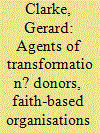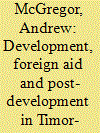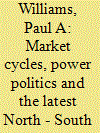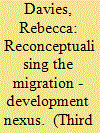|
|
|
Sort Order |
|
|
|
Items / Page
|
|
|
|
|
|
|
| Srl | Item |
| 1 |
ID:
078948


|
|
|
|
|
| Publication |
2007.
|
| Summary/Abstract |
Recent donor discourse points to the potential of faith-based organisations (fbos) as 'agents of transformation', mobilising the moral energy of faith communities in support of the Millennium Developments Goals (mdgs). This new donor-driven agenda, however, invites scrutiny of complementary processes of organisational change within donor institutions. This article therefore examines donor policy and practice concerned with engagement with fbos. While considering the work of a number of donors, it focuses on the UK Department for International Development (dfid) and traces the reasons for dfid's growing interest in fbos from 1997. It examines the challenges which dfid faces in further developing this engagement and considers whether it and others donors can themselves become 'agents of transformation', embracing a less material and less secular vision of well-being and a more culturally inclusive approach to partnership. In contrast to recent scholarship, which presents a benign view of the emerging 'faith and development' interface, this article considers it as a controversial new Zeitgeist in development policy and discourse.
|
|
|
|
|
|
|
|
|
|
|
|
|
|
|
|
| 2 |
ID:
078951


|
|
|
|
|
| Publication |
2007.
|
| Summary/Abstract |
Post-development theories have successfully challenged many of the ways in which we think about development but have yet to substantially influence development practice. In this paper I explore what opportunities exist for applying post-development ideas within the current development apparatus of Timor-Leste. Four types of community-focused programmes are analysed: sectoral project-based initiatives, institutional capacity-building programmes, community partnerships and small grants programmes. While alternative opportunities are clearly shown to be present, it is argued that they are rarely realised because of the overwhelming priority to produce better agents of development, rather than those able to pursue 'alternatives-to-development'. The paper concludes by suggesting that the development apparatus itself may not be inherently faulted; instead this apparatus could be usefully utilised by those inspired by alternative imaginaries to pursue post-development goals.
|
|
|
|
|
|
|
|
|
|
|
|
|
|
|
|
| 3 |
ID:
078945


|
|
|
|
|
| Publication |
2007.
|
| Summary/Abstract |
It is my aim in this article to engage with development and its promises at a time when many people are distancing themselves from the appalling reality of the development industry and the disastrous effects of its interventions. Rather than rejecting the notion of development, I contend that 'engaging with development' remains important in relating to Third World people's dreams and desires. In other words, people's desires for development must be taken seriously and its promises should not be forsaken. I elaborate on the political and ethical implications of the rejection of this notion of development and argue that, through the abandonment of the notion, the very 'object' of development is lost. In other words, the disavowal of development signifies the betrayal of its promise. To elaborate this position, I propose a Lacanian/Deleuzian perspective on development as a 'desiring machine' - which produces endless desires - so as to explore the radical, constitutive disjunction between the 'virtual' world of the development machine and the 'actual' workings of development interventions
|
|
|
|
|
|
|
|
|
|
|
|
|
|
|
|
| 4 |
ID:
078946


|
|
|
|
|
| Publication |
2007.
|
| Summary/Abstract |
Energy trade periodically aligns Northern importing - consuming countries against predominantly Southern producing - exporting countries. Conflict appears to follow a cyclical pattern, whereby Northern firms invest in developing Third World hydrocarbon resources to meet consumer demand until market conditions enable unilateral efforts by host sovereigns to augment fiscal take and ownership share and to impose output restrictions, thereby elevating prices and revenues. Although markets eventually correct themselves, major consuming-country governments, to the extent that seller's markets attributable to exporter actions harm short-term consumer welfare and alternative options for restoring buyer's markets are lacking, have varying incentives to support military intervention. Shifting market conditions and power balances suggest six ideal-typical energy trade conflict strategies. Finally, to the extent that exporting states succeed in converting higher hydrocarbon revenues into energy-intensive economic growth, co-operative phases within this conflict pattern could yield to increasingly zero-sum inter-consumer rivalry.
|
|
|
|
|
|
|
|
|
|
|
|
|
|
|
|
| 5 |
ID:
078950


|
|
|
|
|
| Publication |
2007.
|
| Summary/Abstract |
This article compares the failed military coups in Ecuador (2000) and Venezuela (2002) with the successful 1999 military putsch in Pakistan in order to identify what factors affect coup outcomes in third-wave democracies. The unity of the armed forces in support of the Pakistani coup, and its division in the two Latin American cases, are critical in explaining the divergent outcomes. In turn, the degree of cohesion within the military in each case was affected by perceptions of domestic support and international reaction to military rule. In Ecuador and Venezuela there was greater public antipathy for military rule and stronger international opposition. This increased the armed forces' perceptions of the costs of governing, fostering divisions within the officer corps that ultimately scuttled the coups. In contrast, the successful coup in Pakistan was largely attributable to the unified military, which was a product of greater domestic and international tolerance of military rule.
|
|
|
|
|
|
|
|
|
|
|
|
|
|
|
|
| 6 |
ID:
078944


|
|
|
|
|
| Publication |
2007.
|
| Summary/Abstract |
The phrase 'North - South divide' - as well as variations such as 'North - South gap' or 'North - South cleavage' - has become well established in public discourse and scholarly writing. The phrase, however, is highly problematic, as it is simplistic and as there is a substantial danger of misapprehending it for 'reality' as such. The indiscriminate usage of the phrase 'North - South divide' overlooks the ways in which words create and shape our understanding of the world, on which we, in turn, base our judgements and decisions. The aim of the present paper is to point out specific ways through which this linguistic distinction - as much as any other - shapes our conception of (social) reality. The paper is in two parts. In the first we will initially draw out some pitfalls that inhere in the notion of a 'North - South divide'qua notion, and then point to other pitfalls that relate to the usage of the expression. In the second part two case studies are presented to illustrate our arguments: one of them deals with China, the other with intellectual property rights.
|
|
|
|
|
|
|
|
|
|
|
|
|
|
|
|
| 7 |
ID:
078947


|
|
|
|
|
| Publication |
2007.
|
| Summary/Abstract |
The presence of a sizeable expatriate African population constitutes a potentially exploitable, if undeveloped, resource that represents a significant developmental challenge for the continent. Problematically the global division of labour and power, as well as differences of region, class, generation, ethnicity and race, are not properly recognised within the existing scholarship or development policy. What is clear is that diasporas do have a substantial role to play in development on the African continent. Further theoretical and empirical investigation is necessary to investigate the practical significance, nature and content of diasporic identifications and activities. By setting these against the structural backdrop of the global economy and the closely associated ideology of globalisation, this paper seeks to provide a new basis for understanding the role of the diaspora in development. This has considerable policy implications as to which diasporic populations should be targeted for developmental purposes
|
|
|
|
|
|
|
|
|
|
|
|
|
|
|
|
| 8 |
ID:
078949


|
|
|
|
|
| Publication |
2007.
|
| Summary/Abstract |
This article examines the recent Security Council Resolution 1706 authorising UN peacekeeping in Sudan, in the context of the deteriorating humanitarian crisis in Darfur. It assesses the African Union Mission in Sudan and elaborates on the reasons for its current fatigue and failure. It interrogates the proposed mandate of the UN force, the organising principles and rules of engagement and, sadly, the Realpolitik that continues to derail efforts at ending the genocide. It urges the global community, in particular the Security Council permanent members, to unite their efforts and compel the government of Sudan to accept UN deployment in order to save the dying and end the tragedy in Darfur
|
|
|
|
|
|
|
|
|
|
|
|
|
|
|
|
|
|
|
|
|